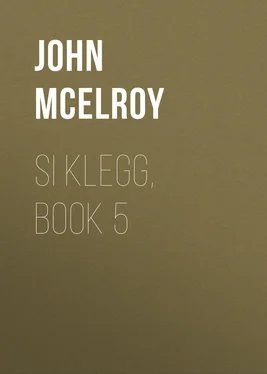John McElroy - Si Klegg, Book 5
Здесь есть возможность читать онлайн «John McElroy - Si Klegg, Book 5» — ознакомительный отрывок электронной книги совершенно бесплатно, а после прочтения отрывка купить полную версию. В некоторых случаях можно слушать аудио, скачать через торрент в формате fb2 и присутствует краткое содержание. Жанр: foreign_prose, История, foreign_edu, foreign_antique, на английском языке. Описание произведения, (предисловие) а так же отзывы посетителей доступны на портале библиотеки ЛибКат.
- Название:Si Klegg, Book 5
- Автор:
- Жанр:
- Год:неизвестен
- ISBN:нет данных
- Рейтинг книги:5 / 5. Голосов: 1
-
Избранное:Добавить в избранное
- Отзывы:
-
Ваша оценка:
- 100
- 1
- 2
- 3
- 4
- 5
Si Klegg, Book 5: краткое содержание, описание и аннотация
Предлагаем к чтению аннотацию, описание, краткое содержание или предисловие (зависит от того, что написал сам автор книги «Si Klegg, Book 5»). Если вы не нашли необходимую информацию о книге — напишите в комментариях, мы постараемся отыскать её.
Si Klegg, Book 5 — читать онлайн ознакомительный отрывок
Ниже представлен текст книги, разбитый по страницам. Система сохранения места последней прочитанной страницы, позволяет с удобством читать онлайн бесплатно книгу «Si Klegg, Book 5», без необходимости каждый раз заново искать на чём Вы остановились. Поставьте закладку, и сможете в любой момент перейти на страницу, на которой закончили чтение.
Интервал:
Закладка:
"I'm goin' down there," he said, after a moment's deliberation. "Providence has sent me on this job, and intends I shall do it right, which I kin by goin' down there. Providence'll take care o' me while I'm goin'. Same time, Providence expects me to show gumption, by not exposin' myself any more'n possible."
Therefore he cut a young, thick-branched cedar and held it in front of him as he crouched and made his way to the gully and down it.
He had nearly reached the cover of the paw-paws, and was beginning to congratulate himself that his cedar screen and the turmoil on the bank above had enabled him to escape attention, when a bullet struck a stone to his left, and threw it against him with such force as to almost knock all the breath out of his body. He fell to the ground, but retained coolness enough to understand that this was to his advantage, and he crawled slowly forward until he was safely behind the bushes.
"That come from that hound in the willers," said he to himself. "He's a sharp one. He got on to me somehow, and now it's me and him fur it. Anyhow, he didn't kill a mule worth $150 with that bullet. But it'll take as much as six bits' worth o' porous plaster to take the swellin' out o' my side where that rock welted me."
He hitched forward cautiously a little farther, to where he could peer through the bushes, being exceedingly wary not to repeat his opponent's mistake, and set their tops in motion. A rock protruding through the ground in front of him made an opening through which he could see, and also afforded a rest for his musket. He looked sharply, and at length was rewarded by seeing the gun-barrel come out by the side of the barked willow, rested on a bare limb, and apparently aimed at the hill beyond. He took a long breath to steady his nerves, stretched out his legs to make himself more at ease, pushed his musket forward until he got exactly the right poise, aimed about nine inches below the level of his opponent's gun-barrel, and a little to the left, drew his bead down to a hair's nicety in the hind sight, and pulled the trigger just as the rebel sharpshooter did the same. Both muskets seemed to flash at the same moment. The rebel sprang up through the willows and fell forward on his face.
The Deacon picked up his gun and walked back up the bank. The Union skirmishers had seen the man fall and raised a yell, which they changed to cheers as they saw the Deacon coming up the bank.
The Captain in command came up and said:
"Sir, I congratulate you. That was splendidly done. I was just getting on to that fellow when you went down. I watched you through my glass, and saw you fetch him. You are entitled to all our thanks."
"No thanks to me, sir. I only done the dooty Providence marked out for me. I hope the man ain't killed. If he is, it's because Providence had fixed the number of his days. I only wanted to stop his killin' mules, and destroyin' Gover'ment property, and let us go on our journey in peace."
"Well, I wish you'd stay here and help us with some more of those fellows over there. I'm sure their time has come, but my men don't seem to be quite as good in carrying out the decrees of Providence as you are."
"Thankee, sir," said the Deacon. "But I must go back and 'tend to my boys. We've got a long ways to go yet to-day."
He went back to the road and reported to the Wagonmaster:
"Now you kin clear away them dead mules and go ahead. You won't scarcely be bothered any more for awhile at least."
CHAPTER V. TROUBLE ENCOUNTERED
IT WAS not until late the next afternoon that the wagon-train finally reached Bridgeport, and the weak, wornout mules had at last a respite from straining through the mud, under the incessant nagging of the teamsters' whips and their volleyed blasphemy.
The Deacon's merciful heart had been moved by the sufferings of the poor beasts. He had done all that he could on the journey to lighten the labor of those attached to his own wagon. He had restrained as much as possible the St. Vitus Dance of the teamster's keen whip, uselessly remonstrated with him against his profanity, carried a rail to help pry the wheels out of the mudholes, and got behind and pushed going up the steep hills. At the journey's end when the exhausted brutes stood motionless, with their ears drooping and their eyes looking unutterable disgust at everything connected with the army and war, the Deacon helped the teamster take their harness off, and carry them as much corn and hay as the Forage-Master could be pursuaded to dole out to them.
The Deacon's next solicitude was to get the boys aboard a train that would start out soon. This was a sore perplexity. All was rush and bustle about the railroad yard. Trains were coming, being switched hither and yon, unloaded, and reloaded, and going, in a way that was simply bewildering to the plain farmer. Men in uniform and men in plain clothes were giving orders, and these were obeyed, and everybody seemed too busy to answer questions or give information.
"Naw; git out. Don't bother me with no questions, I tell you," impatiently said a man in citizen's clothes, who with arms outspread was signalling the switching engines. "'Tain't my business to give information to people. Got all I kin do to furnish brains for them bull-headed engineers. Go to that Quartermaster you see over there in uniform. The Government pays him for knowin' things. It don't me."
"I don't know anything about the different cars, my friend," said the Quartermaster haughtily. "That's the business of the railroad people. I simply order them to make up the trains for me, and they do the rest. There's a Yard-Master over there. Go ask him."
"Blazes and brimstone," exploded the Yard-Master; "how in the devil's name do you suppose I can tell anything about the trains going out? I'm just pestered to death by such fool questions, while the life's being worried out of me by these snoozers with sardine-labels on their shoulders, who strut around and give orders, and don't know enough about railroading to tell a baggage-check from a danger-signal. If they'd only let me alone I'd have all these trains running in and out like shuttles in a loom. But as soon's I get one arranged down comes a shoulderstrap and orders something different. Go off and ask somebody that wears brass buttons and a basswood head. Don't bother me. Get out of the way of that engine there."
In despair, the Deacon turned to a man who wore a Major's shoulder-straps.
"No," he answered; "I'm sorry to say that I cannot give you any information. I'm only in command of the guards here. I haven't anything to do with the trains. The Quartermasters run them, and they run them as they run everything they have anything to do with—like the old man and woman run their fulling mill on the Kankakee—that is, like—
"Dumb this mixin' o' military and civilian," said the irritated Deacon, "It's worse'n mixin' religion and politics, and preachin' and tavern-keepin'. Down there in camp everything was straight and systematic. Every feller what don't have nothin' in his shoulder-straps bosses all the fellers what hain't no shoulder-straps at all. The feller what has one bar in his shoulder-straps bosses all the fellers what hain't nothin in theirs, and the feller what has two bars bosses the fellers with but one; the feller with leaves gives orders to the fellers with bars; the feller with an eagle lays clear over him, and the man with a star jest makes everybody jump when he talks. Out at the depot on Bean Blossom Crick Sol Pringle has the say about everything. He knows when the trains come and when they go, and what goes into 'em. This seems to be a betwixt and between place, neither pork nor bacon, I don't like it at all, I always want things straight—either one thing or t'other—reg'ler close communion, total-immersion Babtist, or free-for-all, shoutin' Methodist."
Читать дальшеИнтервал:
Закладка:
Похожие книги на «Si Klegg, Book 5»
Представляем Вашему вниманию похожие книги на «Si Klegg, Book 5» списком для выбора. Мы отобрали схожую по названию и смыслу литературу в надежде предоставить читателям больше вариантов отыскать новые, интересные, ещё непрочитанные произведения.
Обсуждение, отзывы о книге «Si Klegg, Book 5» и просто собственные мнения читателей. Оставьте ваши комментарии, напишите, что Вы думаете о произведении, его смысле или главных героях. Укажите что конкретно понравилось, а что нет, и почему Вы так считаете.












